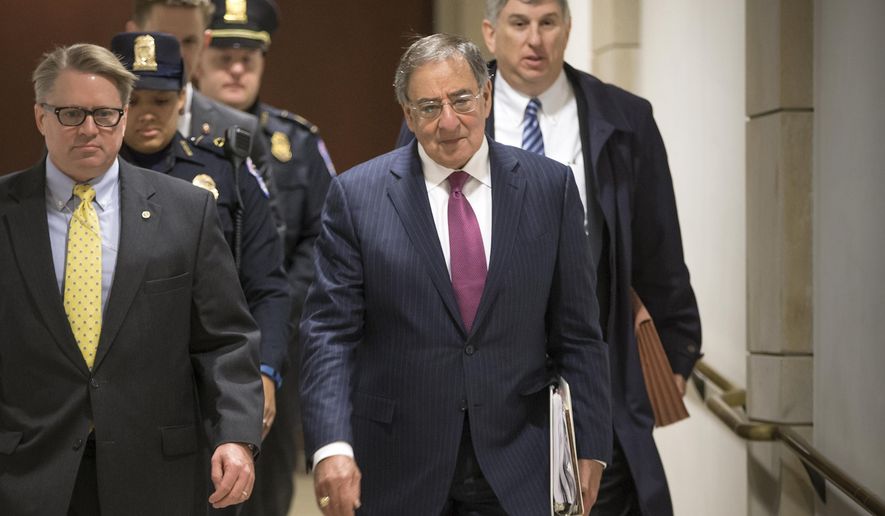Would President Obama take action to prevent Iran from developing a nuclear weapon? “Probably not,” says Leon Panetta, Obama’s former CIA Director and Defense Secretary, in a revealing New York Times Magazine piece that, predictably, has all of official Washington atwitter - for, naturally, all the wrong reasons.
Let’s review. In order for propaganda to be effective, two things must generally be true: the lie must be believable, and it also must not feel like propaganda. Thanks to a New York Times Magazine profile piece this week, the White House’s Iran Deal propaganda campaign now definitively fails on both counts.
Ben Rhodes, the White House’s Deputy National Security Adviser, is the subject of a revealing - and unintentionally devastating - profile piece by David Samuels, which ran in Sunday’s magazine.
In the long-form interview, Mr. Rhodes coyly boasts of duping the American public about President Obama’s unilateral deal with Iran, and even goes as far as bragging about his ability to weave a narrative entirely divorced from reality and sell it to the American public. In great detail, Mr. Rhodes describes how he was able to manipulate the press corps - and, through it, the public - about the Iran Deal. In an unflattering description, Rhodes portrays foreign policy journalists as “27-year olds” who “literally know nothing.”
Mr. Samuels describes Rhodes, an aspiring novelist, as an “adept” storyteller with a special talent for developing “overarching plotlines with heroes and villains.” It is, therefore, not surprising that this masterful storyteller is the “shaper and retailer of Obama’s foreign-policy narratives.”
Mr. Rhodes occupies a puzzling role on President Obama’s foreign policy team. Rhodes is an official White House staffer with a salary paid by U.S. taxpayers, and whose sole job it is, as he freely brags in the interview, to craft narratives and storylines for the American public’s consumption about the objectives and results of President Obama’s foreign policy agenda - most notably the unpopular Iran Deal.
Washington, D.C. is, quite justifiably, in an absolute uproar this week about the interview and Mr. Rhodes’ acknowledgement that President Obama’s White House intentionally mischaracterized the nature of the Iran Deal. Part of the mischaracterization of the Iran Deal stems from the White House’s repeated insistence - crafted by Rhodes himself - that the deal was the only viable option in the choice between war and peace with Iran. The false choice between war and peace was misleading by design, and that’s why Rhodes, with his ability to spin a good yarn, was such an important part of the messaging strategy.
But as unsettling as the interview with Mr. Rhodes is, there is an even more disconcerting tidbit of information conveyed in the NYT Magazine profile. Former CIA Director and Defense Secretary Leon Panetta provides a chilling assessment of President Obama’s motivation to pursue the agreement. The Iran Deal was inextricably linked, in President Obama’s mind, to the legacy he wanted to leave in the Middle East.
Reaching a deal was the president’s paramount goal; and, in his zealous pursuit of that deal, he jettisoned all commonsense metrics to hold the terror-sponsoring regime accountable.
Because the signed deal was more important to the president than the actual contents of the deal, President Obama threw in everything plus the kitchen sink in terms of giveaways to Iran. Sanctions relief (upwards of $150 billion), weak (nearly non-existent) inspection requirements, and very little accountability or oversight were all part of the final deal. But, hey, on the bright side, President Obama got the deal he wanted for his legacy.
But the most frightening revelation of the entire article comes in the following exchange between the author and Mr. Panetta, who says of Iran, “If brought to the point where we had evidence that they’re developing an atomic weapon, I think the president is serious that he is not going to allow that to happen.” The author then asks, “But would you make that same assessment now?” to which Panetta responds, “Probably not.”
You read that right - Leon Panetta, former CIA Director and Defense Secretary, just told The New York Times he does not think the president he served would act to prevent Iran from acquiring a nuclear weapon.
So all the promises the White House made about the strict enforcement of the deal and the guarantees that we could trust Iran turn out to be pure fiction. At least now it’s abundantly clear why the White House needed to rely on the talents of a novelist for this initiative.
This New York Times Magazine piece unwittingly confirms Americans’ worst fears. The article supports what we have been saying for the past year: The Iran Deal was misguided, it was - and remains - so unpopular that it requires a professional “storyteller” to market it to an unconvinced American public, and President Obama really isn’t all that interested in whether or not Iran lives up to its end of the deal.
If nothing else, the profile piece is an important reminder that Congress should renew its scrutiny and oversight of all aspects of President Obama’s legacy deal with Iran.




Please read our comment policy before commenting.